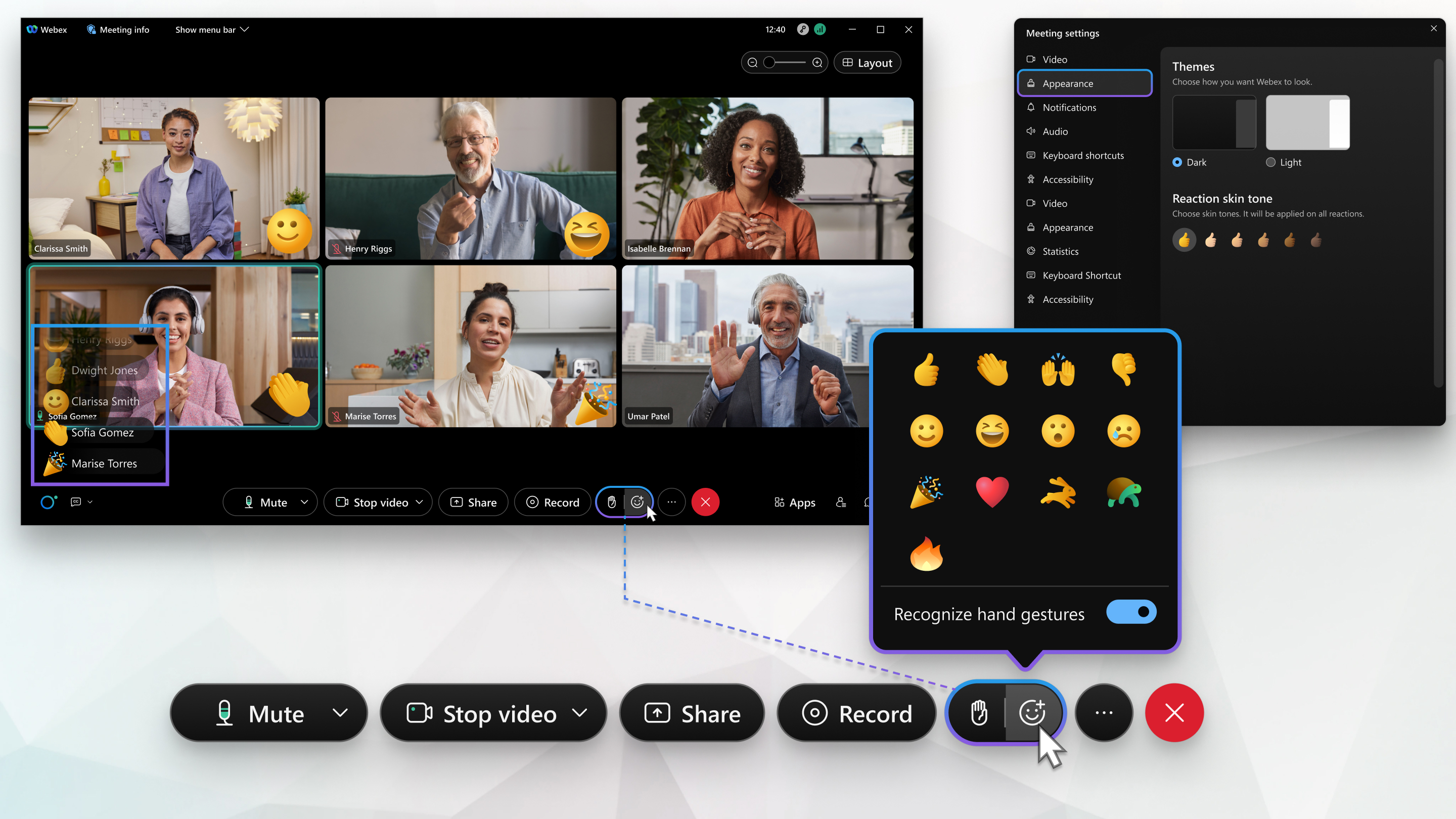- Home
- /
- Article

Use reactions in Webex Meetings and Webex Webinars
 In this article
In this article Feedback?
Feedback?Animated reactions let participants express themselves without saying anything in a meeting, webinar, or breakout session. Cheer on the speaker with the clapping hands reaction, or appreciate a joke with the haha reaction. As a presenter, you can get a sense of the audience's response by asking participants to give a quick thumbs up or thumbs down.

You can choose from 12 emojis to give instant feedback:
-
Thumbs up
-
Clapped hands
-
Celebrate
-
Smile
-
Haha
-
Wow
-
Sad
-
Thumbs down
-
Slow down
-
Speed up
-
Thanks
-
Fire
This feature is available for Meetings and Webinars. It's not available for webinars in webcast mode.
| 1 |
In the meeting or webinar controls at the bottom of the window, click Reactions
|
| 2 |
Click an emoji to use it as a reaction. The reaction appears in the lower-right corner of your video thumbnail. Others see your reaction in the lower-right corner of your video, when your video is in their view. When your video is not in others' view—for example, when someone is sharing content or when the meeting or webinar has too many participants for the meeting window—your reaction appears in the lower-left corner of the meeting or webinar window. The host can choose whether to show names with reactions in the meeting or webinar. |
As the host, you can disable reactions in meetings and webinars.
|
For Windows, select or , and then uncheck the Reactions check box. For Mac, select or , and then uncheck the Reactions check box. |
Gesture controls allow you to use reactions without having to select them from the Reactions menu. Get the meeting or webinar host's attention by physically raising your hand or encourage the speaker by giving them a thumbs up. Once Webex recognizes your gesture, it's shared with everyone in the meeting or webinar.
There are three hand gestures that you can use to create a reaction: thumbs up, thumbs down, and clapping hands. Reactions that recognize hand gestures are outlined in the Reactions
 menu. You can also raise your hand using a gesture to get the host or speaker's attention.
menu. You can also raise your hand using a gesture to get the host or speaker's attention.
The following Webex versions, operating systems, and computers and devices support hand gesture recognition. If your computer or laptop doesn't meet the requirement, hand gestures won't be recognized.
Windows
Operating System:
-
Windows 10 version 10.0.17763 or later
Processor:
-
4 physical cores or more
Memory
-
4GB or more of RAM
Mac
Webex Version:
-
Meetings—WBS41.1 or later sites
-
Events—WBS41.6 or later sites
Operating System
-
macOS High Sierra (version 10.13) or later
Processor:
-
Intel Core i5 6000 series dual-core processor or higher
-
Intel Core i7 5000 series dual-core processor or higher
-
Intel Core i7 quad-core processor or higher
-
Intel Core i9 dual-core processor or higher
-
Intel Xeon dual-core processor or higher
-
Intel Core m3 7000 series dual-core processor or higher
-
Other Intel processors: 6 cores or higher
-
Non-Intel processors: 8 cores or higher
| 1 |
During the meeting or webinar, go to Reactions
|
| 2 |
Click the slider next to Recognize hand gestures to turn it on or off. When the slider is blue, hand gesture recognition is on. |
| 1 |
To send a reaction using a hand gesture, make the gesture in front of your camera until Webex recognizes the gesture. |
| 2 |
Hold the gesture until the blue circle is drawn on the screen and the reaction animation plays. If you stop making the gesture before the animation plays, your gesture won't be shared.  If you raised your hand using the gesture and want to lower your hand, click Reactions
|
As the host, you can show or hide an attendee's name with their reaction.
|
For Windows, select or , then check or uncheck the Show display name with reactions check box. For Mac, select or , then check or uncheck the Show display name with reactions check box. |
Add a personal touch to your hand gesture reactions by customizing them. Available on 41.12 and later sites. To find out which version you're using, go to Find your Webex Meetings version number.
For Windows:
If you're in a meeting, select , and then select the one you like.
If you're in a webinar, select , and then select the one you like.
For Macs:
If you're in a meeting, select , and then select the one you like.
If you're in a webinar, select , and then select the one you like.
| 1 |
Tap More
|
| 2 |
Tap an emoji to use it as a reaction. The reaction appears in the center of your video thumbnail. Others see your reaction in the center of your video when your video is in their view. When your video is not in others' view—for example, when someone is sharing content or when the meeting or webinar has too many participants for the meeting window—your reaction appears in the lower-left corner of the meeting or webinar window so that everyone knows how you're feeling. Your name may or may not appear with your reaction, depending on how the host has set up the meeting or event. |
If you want to stay focused on the current speaker or shared content, you can hide the reactions of people who aren't currently visible.
|
Tap The Reactions icon turns gray
 when you hide them. when you hide them. |
As the host, you can disable reactions in Meetings and Events webinars if you want to keep the focus on the speaker.
| 1 |
During the meeting or webinar, tap More
|
| 2 |
Do one of the following based on your device:
|
| 3 |
Toggle Reactions off so that the slider turns gray. |
As the host, you can show or hide an attendee's name with their reaction.
| 1 |
During the meeting or webinar, tap More
|
| 2 |
Do one of the following based on your device:
|
| 3 |
Toggle Show display name with reactions on or off. The option to show display names with reactions won't appear unless you toggle reactions on. |
Known issues and limitations for reactions
-
People viewing a live stream of the meeting can't see reactions.
-
Reactions aren't included in meeting and webinar recordings.
-
You can't use reactions until the host joins the meeting.

 (iOS and Android phones) or
(iOS and Android phones) or  to hide reactions.
to hide reactions.
